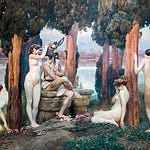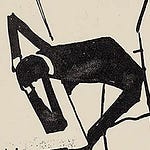Welcome back to The Invisible College, my series of literature courses for paid subscribers. The 2024 syllabus can be found here. This episode is the third in a three-week sequence on Herman Melville’s Moby-Dick; the first 25 minutes are available to all, the total two hours and 15 minutes reserved for paid subscribers. Here we discuss Shakespeare’s overwhelming influence on Melville, especially the final third of this novel. We also read Melville’s manifesto, “Hawthorne and His Mosses,” which argues that an American Shakespeare will succeed the bard because liberated by the Declaration of Independence and “republican progressivism” to tell the truth. We also consider Melville’s homoerotic paean to Hawthorne and his praise of the writer’s “power of blackness.” This leads back to Moby-Dick: to its homoerotic phallicism and its transvaluation of racial values. With help from D. H. Lawrence and Toni Morrison, we discover in Melville a partisan of black revolution. We also consider Ishmael’s pluralism, pragmatism, and perspectivism as a narrator; another critical passage, this time from James Wood, finds atheism and polytheism in Melville’s flood of metaphor. We dwell on the novel’s epic and tragic sublimity, its quarrel with Emerson over self-reliance, and its conflict between individual and community. With Charles Olson, we examine its occult subtext, as Ahab takes the left-hand and Ishmael the right-hand path. Finally, we read the ending—and, following a suggestion from a commenter, test the idea that Ishmael and Ahab are doubles, the myriad-minded narrator what the monomaniacal captain would be if he’d survived his tragic apotheosis. Please like, share, comment, and enjoy!—and please offer a paid subscription so you don’t miss the rest of the American literature sequence, including forthcoming episodes on Walt Whitman and Emily Dickinson, not to mention the archive of episodes on modern British literature from Blake to Beckett and our previous sequences on the works of Joyce, including Ulysses, and on George Eliot’s Middlemarch. The slideshow corresponding to the lecture can be downloaded below the paywall:
Listen to this episode with a 7-day free trial
Subscribe to Grand Hotel Abyss to listen to this post and get 7 days of free access to the full post archives.












